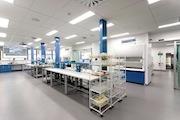The vision of the Produced Water Research Group (PWRG) is to:
- build national capacity in the science, knowledge and impacts of produced water,
- develop, advise and train professionals to understand, predict and mitigate the impacts of produced water, and
- inform management decisions to understand, predict and mitigate the impacts of water production and use.
Areas of studies within the PWRG include both fundamental and applied research. Fundamental research into physical, chemical and biological characterisation is essential for generating high quality water quality data to understand, predict and mitigate the impacts of produced water on the physical, chemical and biological environs. This “bottom-up” approach is considered most appropriate in Australia where clean water is a scarce resource and baseline water quality information are often lacking for regions currently exposed to storage of large volumes of produced water by resource industries. Applied research is concentrated on the use of water quality information for differentiating stacked aquifers, design of water sampling and monitoring programs, groundwater baseline testing prior to exploration drilling and formulation of pollution control plans and evaluation of water treatment options for reuse, discharge or other means of management.
Through close collaboration with research centres within Macquarie University, researchers from other institutions and close involvement of industry personnel in the research work the PWRG will ensure that the generated information on produced water quality are scientifically validated and its research output is of significant practical value to the industry.

What is produced water?
Produced water is a term commonly used in the oil industry for water co-produced with oil and gas production. However it may be applied in a broader context to include water generated as a result of other industrial activities, including but limited to water generated from enhanced oil recovery, mining (water seeping from rock strata into open cut and underground mines), mineral processing, coal power generation, irrigation, food and fibre production and renewable energy generation. Produced water can be salty and/or contain other contaminants that may limit the options for its direct disposal or beneficial reuse, unless treated beforehand.
PWRG structure and operation
Macquarie researchers come from the Departments of Environmental Science, Chemistry and Biomolecular Sciences, and Earth and Planetary Sciences. Dr Aharon Arakel, Adjunct Professor at the Faculty of Science and Engineering, has been closely involved with the PWRG since its inception and is a strategic member of the Group.
Capabilities
By virtue of the research strengths of its existing members, the PWRG has a strong focus on the application of novel and advanced analytical chemistry to characterisation and classification of various produced water streams. The PWRG is particularly well placed for undertaking baseline water quality studies for mining and energy resource development projects and in application of advanced geochemical and isotope chemistry “fingerprinting” methods for the delineation of migration pathways between produced water, formation brines and shallow aquifers. Through our affiliation with experts in produced water treatment technologies we offer unique capabilities in integrated evaluation of produced water quality and options for beneficial use of such waters to reduce the potential impacts on surface environs.
We continuously strive to expand our scientific and technical skill bases, access to state-of-art analytical equipment and our research management capabilities through new collaborative arrangements and industry alliances.



